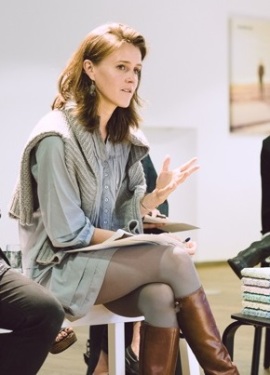
BWC Recommends is a segment asking our members to talk about their favourite literary meals. Those paragraphs that are so rich they take a while to digest, that packet of word crisps you put in the cupboard but keep going back for until the whole thing is empty, that comforting poetry soup you heat up when you’re not feeling well. What is it about these novels, plays or poems that makes them so delicious?
This time we’re talking with BWC member Jeanie Keogh. Jeanie’s short stories have been published or are forthcoming in the Canadian literary magazines Riddle Fence, Broken Pencil, Grain, FreeFall, Room, and The Puritan. Her play Baby Making was produced by Thought Bubble Theatre and staged at both The Geordie Theatre in Montreal, Quebec, and The Harbourfront Centre in Toronto, Ontario as part of the Summerworks’ theatre festival. She has completed degrees in creative writing, journalism and theatre. On this side of the Atlantic, she currently works as an editor for a press agency and is the fashion and travel writer for Together magazine.
What are your five favourite books (or poems or plays)?
I can’t answer questions like this without feeling seriously muzzled and tranquilized so I’ll cheat and list my top favourite contemporary fiction reads in the past two years.
In the long fiction category: ‘We Need To Talk About Kevin’ by Lionel Shriver and ‘A Girl is a Half-formed Thing’ by Eimear McBride.
In the short fiction collection category: ‘Better Living Through Plastic Explosives’ by Zsuzsi Gartner, ‘No One Belongs Here More Than You’ by Miranda July, and ‘This Cake is For the Party’ by Sarah Selecky.
We would never try to muzzle you Jeanie, and we so rarely tranquilize people. Choosing one book from the list above, can you tell us what you found tastiest about it?
Cheating again. I’m choosing two. I’d have to say Shriver’s bravery in taking on such a daring subject in ‘We Need To Talk About Kevin’ and doing so from such a controversial point of view. From a socio-political standpoint, it was a story that needed to be told and was so unapologetically. Reading her feels like being in freefall with no parachute.
And ‘A Girl is a Half-formed Thing’ by Eimear McBride reads like the voices you hear in dreams. The tone is lone Yo-Yo Ma cello meets Nirvana. Her style is brutally raw, the plot is take-no-prisoners, her characters are headed from the first page toward a train wreck end.
Who is your favourite writer? Why do you like him/her?
There is nothing that Joseph Boyden could write that I wouldn’t read. Same for Ali Smith, Jonathan Franzen, Dave Eggers, David Mitchell and Jose Saramago. Wow, I’m really not following rules here….
Cracking the spines of these books, you know you’re in for a good literary ride. Personally, I have a sense that I’m going to close the book a changed being, or at the very least, my perception of “the way things are” will have radically shifted. In each, you learn something about the human condition you didn’t know before. What they all have in common is their ability to write characters so complex and well-defined that even the most unsympathetic ones are people whose motivations you understand and can even feel compassion towards. Not to mention they tackle subjects head on in a way that makes the reader come to realisations about themselves that even the best psychologist could never unveil.
Eddie Murphy once said, “Anything you have to acquire a taste for was not meant to be eaten.” Have you ever forced yourself to read something because you were told it was ‘good for you’? If yes, what did you learn from this experience? If no, tell us about a book that you hated.
I read ‘Eat, Pray, Love’ by Elizabeth Gilbert because I was sick of telling people why I would never read it and how I didn’t need to read more than twenty pages to know how terrible it was.
What put me off the book was that it was shelved as literary fiction in the bookstore rather than as well-written self-help. Beyond that, the premise bemoaning the broken-hearted, well-off American woman in search of herself while travelling seemed a bit thin and there didn’t seem to me to be much in the way of suspense, unless you belong to the first-world problems set.
Then I watched a TED talk featuring her and she didn’t seem like a totally pretentious self-help charlatan after all. As much as she is a one-hit literary wonder, the book was not as egregious as I thought it was going to be. And it withstood my initial scathingly critical and biased attitude towards it.
